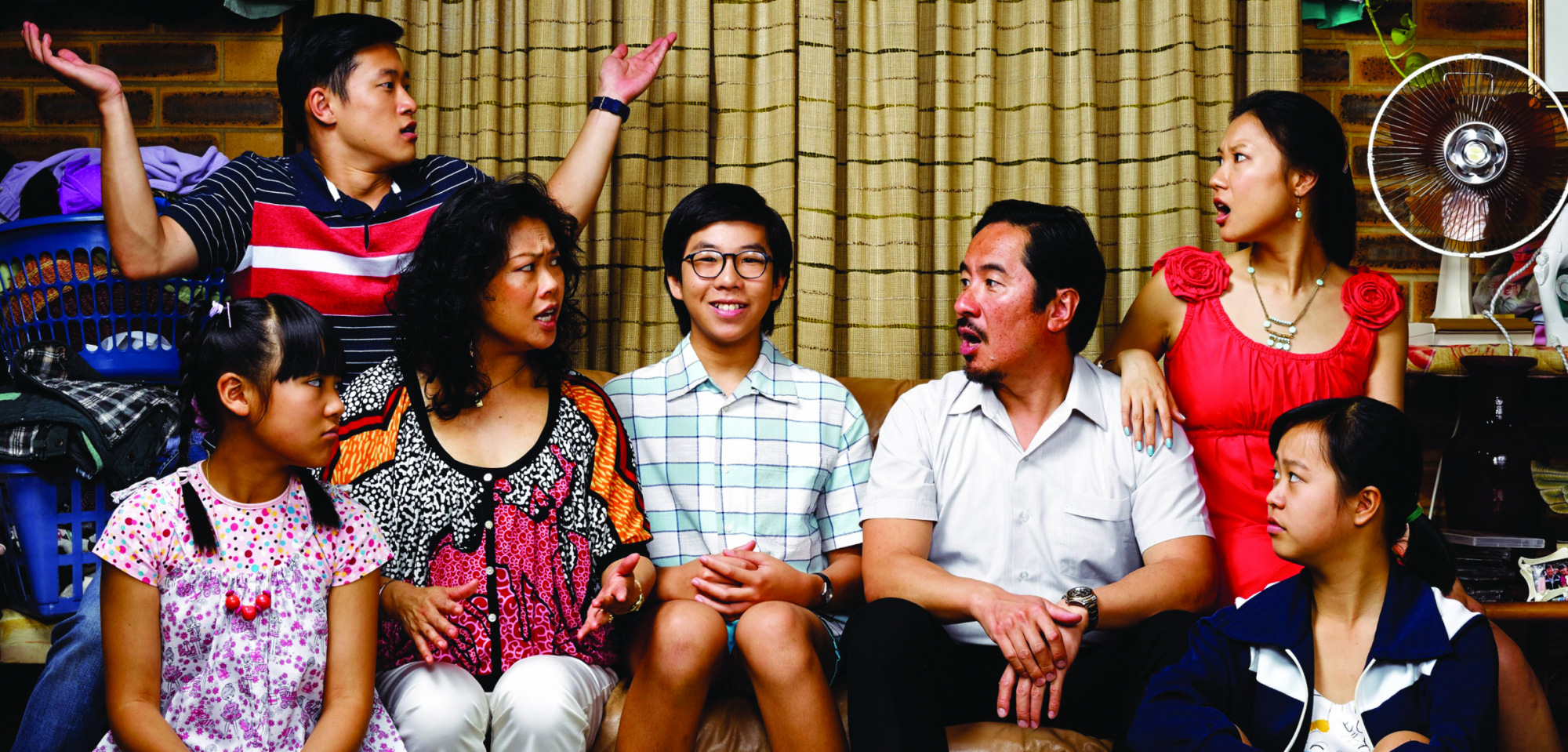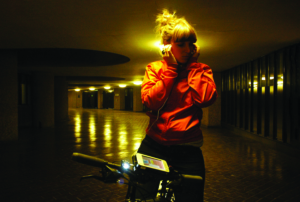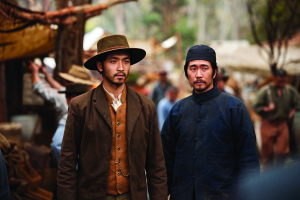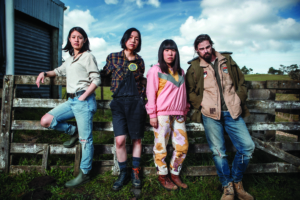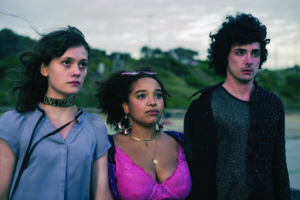It’s often remarked that we live in the golden age of television. In some ways, this appears to be true: the medium has never been taken more seriously by creators, critics and audiences. The best writers have elevated show recaps into an artform. The small screen, once maligned as the ‘idiot box’, is no longer a second-rate substitute for the feature film. With so many impeccable productions at our fingertips, it’s impossible not to see Australian television as being comparable to its global counterparts. The comparisons, however, are deeply unflattering. Australian television is a hermetic ecosystem, oddly resistant to real-life trends. Despite waves of immigration from Europe, Asia, the Middle East and Africa over the past half-century, the faces we see on local TV – on breakfast programs; presenting the news; on sitcoms; in hip, inner-city dramas – are predominantly white. Switching on free-to-air TV feels like time travel, or a fantasy from a bygone era. The world that I, as someone of mixed race, see on the small screen feels foreign and, well, unreal: the cities we inhabit rarely look so monocultural.
The days of ‘White Australia’ may be long gone, but the sentiment looms as an ambient threat on TV. Society’s latent desires often find their initial expression in nostalgia,[1]See Fredric Jameson, Postmodernism, or, The Cultural Logic of Late Capitalism, Duke University Press, Durham, 1991. which may explain why the bulk of locally made dramas (Packed to the Rafters, Seachange, Home and Away, Neighbours, The Secret Life of Us) rely on a selective portrait of Australian identity: white, home-owning (or, at least, aspiring to be), solidly middle-class. Commercial TV is a microcosm untouched by the exogenous forces of economics, politics and culture. Bland storylines may be out of step, but they also reflect a yearning for simpler times – or the misguided idea that viewers, the majority of whom are white Australians, will only relate to stories about people who look, talk and live like them.
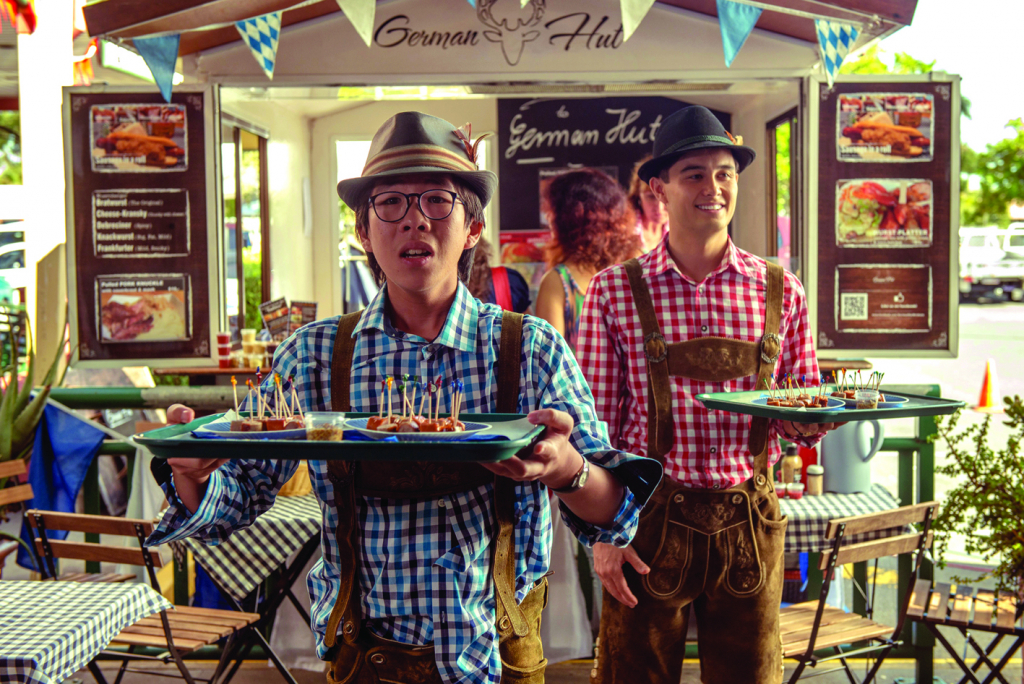
Things are, however, slowly changing. Diversity has evolved from a buzzword and into something of a demand, particularly from younger audiences and those who desire a genuine cultural dialogue, rather than a half-hearted feint, around non-white experiences. The Family Law, based on the memoir of the same name by writer Benjamin Law, is described by SBS in its promotional copy as ‘the story of a sprawling Chinese-Australian family of seven who are unlike any you’ve ever met. And yet, they may also be disturbingly familiar’.[2]‘The Family Law: About the Series’, SBS website, 30 November 2015, <http://www.sbs.com.au/programs/the-family-law/article/about-series>, accessed 2 May 2016. The phrasing here is an appeal to the universal. Ninety per cent of The Family Law’s cast are of Asian descent[3]Annabel Ross, ‘Benjamin Law Puts Multicultural Australia in the Spotlight’, The Sydney Morning Herald, 7 January 2016, <http://www.smh.com.au/entertainment/tv-and-radio/drama/benjamin-law-puts-multicultural-australia-in-the-spotlight-20160101-glxscw.html>, accessed 2 May 2016. – an uncommon sight on Australian television screens – and one of the show’s executive producers, Tony Ayres, is a Chinese-Australian whose work wrestles with questions of identity politics. Yet the themes are familiar to mainstream audiences: the exuberant, oversharing mother; the workaholic father; the internecine conflicts between siblings. In the Law house, hearts are full, emotions are frequently running at full tilt, and the collective wit is as sharp as a switchblade. Household life may be less of a highwire act for the rest of us, but every family is dysfunctional in its own way; organised chaos is often the only way ‘order’ can prevail.
We watch an adolescent with the best intentions grapple with the limits of his agency. At some point, Law recounts, we’ve all been ‘a young person trying to put themselves at the centre of an adult situation they think they can repair’.
Law’s much-lauded memoir is a collection of meticulously drawn vignettes that are as poignant and tender as they are bawdy and outlandish. They canvas expansive territory: the protracted breakdown of his parents’ marriage, being queer in a small town in Queensland, life as a child of Asian migrants in Australia, and his parents’ tumultuous family upbringings, to name a few. This intricate patchwork of narratives is one of the book’s greatest strengths, but it made making a television show a more challenging task. ‘The book doesn’t have an arc,’ Law tells me.
It doesn’t even have a throughline. It deals with cultural identity, my parents and their cultural history; it deals with their divorce, with me coming out as gay. Like, that’s not a TV show – that’s a mess!
The show retains the book’s enveloping warmth and humour, but the process of adaptation was not an easy one. To turn a fragmented memoir into a six-part comedy-drama series, Law and his team had to find a story arc that would be compelling on screen. Eventually, they chose to focus on the crumbling relationship between Law’s parents, Jenny (Fiona Choi) and Danny (Anthony Brandon Wong), which, in the show, falls apart over the course of one humid Queensland summer (even though it disintegrated slowly and somewhat painfully in real life).
The show frames the divorce as a comedy by presenting a fourteen-year-old, fame-driven Benjamin (Trystan Go) as the valiant yet perpetually thwarted saviour. (The ritual of joint custody is a fruitful source of gags.) Benjamin goes to extraordinary lengths to keep his parents’ marriage alive – in a particularly memorable moment, he stages a one-man role-play to remind Jenny and Danny of the origins of their love – but, inevitably, the complexities of real life get in the way. This is no ‘conscious uncoupling’,[4]See Louis Degenhardt, ‘What Is Conscious Uncoupling?’, The Guardian, 26 March 2014, <http://www.theguardian.com/lifeandstyle/2014/mar/26/conscious-uncoupling-gwyneth-paltrow-chris-martin>, accessed 4 May 2016. but rather an epiphany of dreams diverged, of once-unified aspirations devolved into grievances. It should be heartbreaking, yet it’s gently funny, too, as we watch an adolescent with the best intentions grapple with the limits of his agency. At some point, Law recounts, we’ve all been ‘a young person trying to put themselves at the centre of an adult situation they think they can repair’. Go marshals this desire and deploys it to great effect – at one point, Benjamin tries to keep the peace by cooking the Christmas turkey, with calamitous results – summoning the dogged determination and sharp wit of a person who is serially underestimated and perennially willing to please. When Law watched Go and the other cast members perform, a sensation rippled through his body: ‘Muscles I didn’t even know existed relaxed,’ he says.
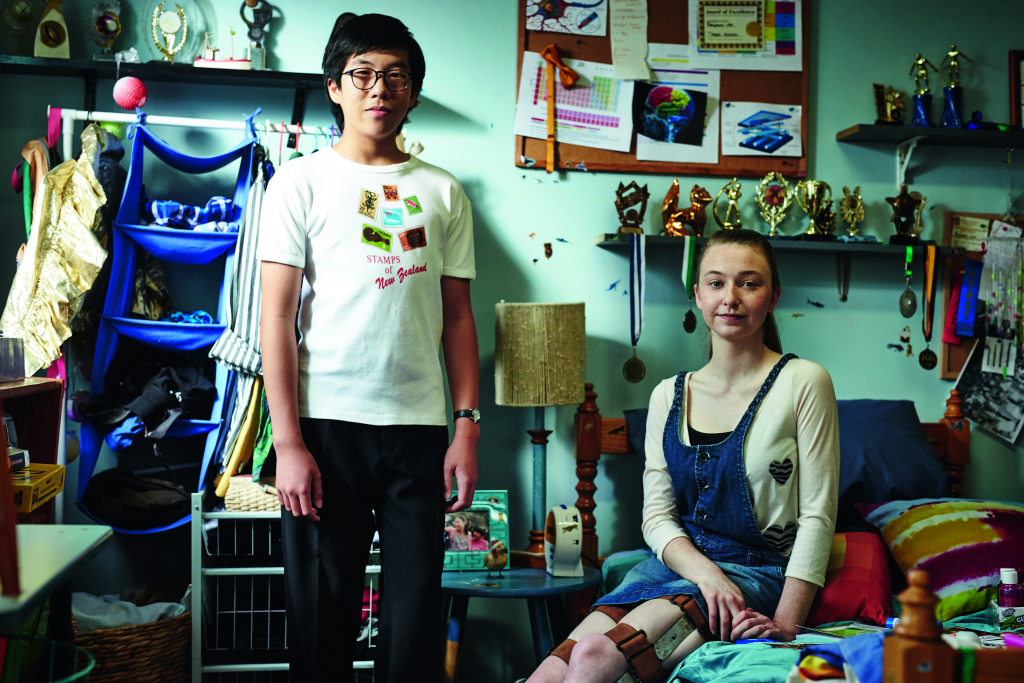
In recent years, a number of TV shows in Australia and abroad have focused on issues surrounding racial politics and ethnic identity. And now, some attention – long overdue – has been shone on diversity in casting and narratives. While some shows have received critical acclaim, others have chafed with the groups they represent. Fresh off the Boat, the US TV show loosely based on the raucous, acerbic memoir of American restaurateur Eddie Huang, has been seen as an affectionate portrayal of Asian-American identity on mainstream television.[5]See, for example, Jimmy Nguyen, ‘A New Era for Asian Americans in Starring Roles’, The Huffington Post, 21 February 2015, <http://www.huffingtonpost.com/jimmy-nguyen/a-new-era-for-asian-americans-in-starring-roles_b_6727266.html>, accessed 2 May 2016. It is the first US primetime sitcom to feature an Asian family as its main protagonists since the ill-fated All-American Girl of the 1990s, which starred comedian Margaret Cho and was cancelled after one season. (Many Korean-Americans were displeased with how they were portrayed, and critics found it universally unfunny.[6]K Connie Kang, ‘Girl Undergoes Major Changes amid Criticism’, Los Angeles Times, 11 March 1995, <http://articles.latimes.com/1995-03-11/entertainment/ca-41514_1_korean-american>, accessed 2 May 2016.) But Huang soon expressed distaste for how Fresh off the Boat was being developed: he felt the specificity of his experiences was being diluted to suit mainstream audiences, that his memoir’s unsparing and brutal portrayal of the Taiwanese immigrant experience had been compromised. He told The New York Times’ Wesley Yang that the TV adaptation of his memoir amounted to ‘reverse yellowface’ – that the Asian characters were little more than ciphers for a storyline in a saccharine American sitcom with American values.[7]Wesley Yang, ‘Eddie Huang Against the World’, The New York Times Magazine, 3 February 2015, <http://www.nytimes.com/2015/02/08/magazine/eddie-huang-against-the-world.html>, accessed 2 May 2016. The vibrancy of his life story had been dulled.
‘We’ve had so few non-white faces on Australian TV. Hopefully we get to a point where it’s so incidental, so non-remarkable that these shows can be taken on their own merits.’
– Benjamin Law
Closer to home, the Nine Network’s Here Come the Habibs, which centres on the lives of a Lebanese-Australian family, courted controversy even before it aired. The riotous humour of Paul Fenech’s SBS series Pizza proved similarly divisive. Earlier attempts at ethnocentric comedy, such as The Wog Boy (Aleksi Vellis, 2000) and Channel 7’s Acropolis Now, traded in stereotypes so broad they seemed bland at worst and cartoonish at best: what, I wondered, were we really laughing at? Striking the balance between an accurate depiction of cultural nuances and making these references accessible to a wider audience can land one in fraught territory. Then there’s the issue of avoiding offence to the group being portrayed, without adulterating comedic edge. In a way, The Family Law neatly sidesteps these concerns. It’s primarily preoccupied with family relationships, with issues of race and cultural integration looming in the background. In one episode, Candy (Shuang Hu), Benjamin’s eldest sister, finds out her true-blue fiancé hasn’t informed his parents of their impending nuptials because they are One Nation party members; in another, Benjamin turns up to a shifty talent scout’s round of auditions and is shocked to see Klaus (Takaya Honda) – Benjamin’s Eurasian nemesis and unknowing crush – at the same audition. ‘Is there a quota?’ Benjamin spits in exasperation. ‘He’s only half-Asian!’
Law shares that he enjoys narratives about identity politics, but they don’t necessarily inform the show’s sensibility. What he has noticed is a growing tendency among cultural commentators to pit The Family Law against Fresh off the Boat (as two Asian family comedies), or even against Here Come the Habibs. He finds this perplexing, if not somewhat reductive: ‘God, we’re not even talking about Asians anymore; we’re talking about Arab-Australians versus Asian-Australians,’ he laughs. Only in a cultural landscape so homogenous can such a media response be elicited. The visibility of an ‘Other’ often provokes stirrings of panic, or perhaps a fear of obsolescence amid a shifting new order. Indeed, our screen industry is one that views the Logie nominations of Waleed Aly and Lee Lin Chin as a gesture towards ‘political correctness’. In a seemingly lighthearted exchange on the Nine Network’s Today show, Karl Stefanovic claimed his co-host Lisa Wilkinson was not nominated for a Gold Logie because she was ‘too white’. She responded: ‘I got a spray tan and everything, still didn’t make it. What can you do?’[8]Amanda Meade, ‘Lisa Wilkinson “Too White” for Gold Logie, Jokes Karl Stefanovic’, The Guardian, 5 April 2016, <http://www.theguardian.com/media/2016/apr/05/today-presenter-jokes-lisa-wilkinson-too-white-logies>, accessed 2 May 2016.
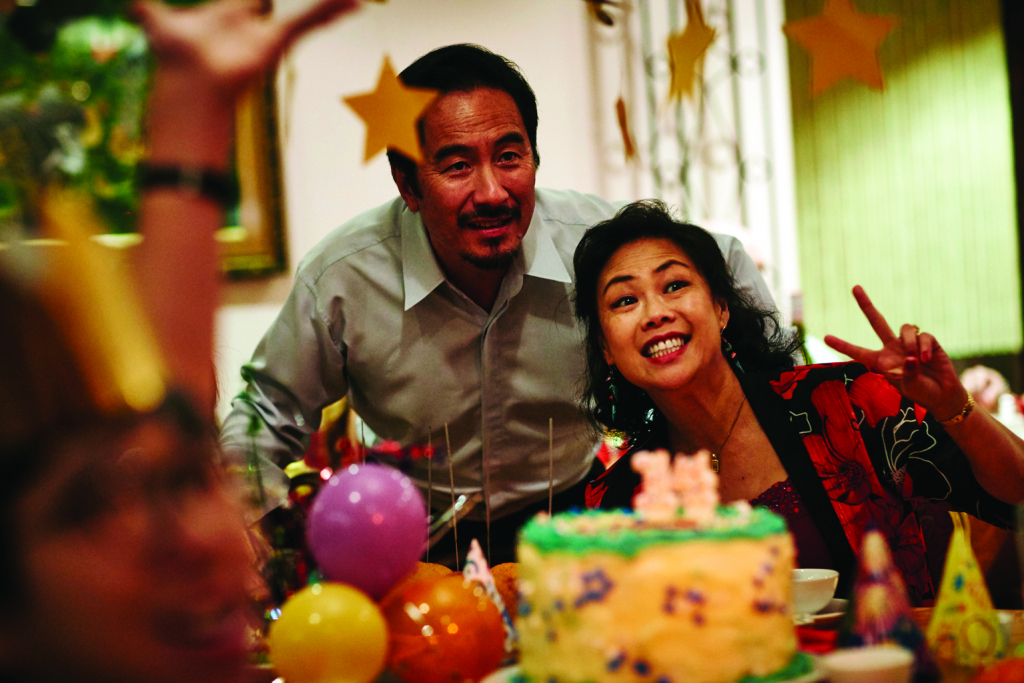
Asians represent roughly 10 per cent of the Australian population,[9]See Tim Soutphommasane, ‘Are Asian Australians Trapped Under a Bamboo Ceiling?’, The Guardian, 11 July 2014, <http://www.theguardian.com/commentisfree/2014/jul/11/are-asian-australians-trapped-under-a-bamboo-ceiling>, accessed 2 May 2016; and Tim Colebatch, ‘Land of Many Cultures, Ancestries and Faiths’, The Sydney Morning Herald, 22 June 2012, <http://www.smh.com.au/federal-politics/political-news/land-of-many-cultures-ancestries-and-faiths-20120621-20r3g>, accessed 5 May 2016. but remain underrepresented in the entertainment industry. While, broadly speaking, this fact is striking in 2016, Law asserts that it’s
kind of expected, in a way, because we’ve had so few non-white faces on Australian TV. Hopefully we get to a point where it’s so incidental, so non-remarkable that these shows can be taken on their own merits.
Rhetoric is one thing, but delivering on diversity is another. Ayres, who also executive-produced the ABC’s Maximum Choppage (starring Lawrence Leung), tells website Joy House Productions that the Anglocentric network status quo would be difficult to shift:
Diversity for the Australian entertainment industry is like ‘gay marriage’ for Australian politics. A lot of people believe in it, but few people are prepared to cross the floor to vote for it.[10]Tony Ayres, quoted in ‘Q & A with Australian Screenwriter/Producer/Director Tony Ayres’, Joy House Productions, 8 April 2015, <http://joy.net.au/q-a-with-australian-screenwriter-producer-director-tony-ayres/>, accessed 2 May 2016.
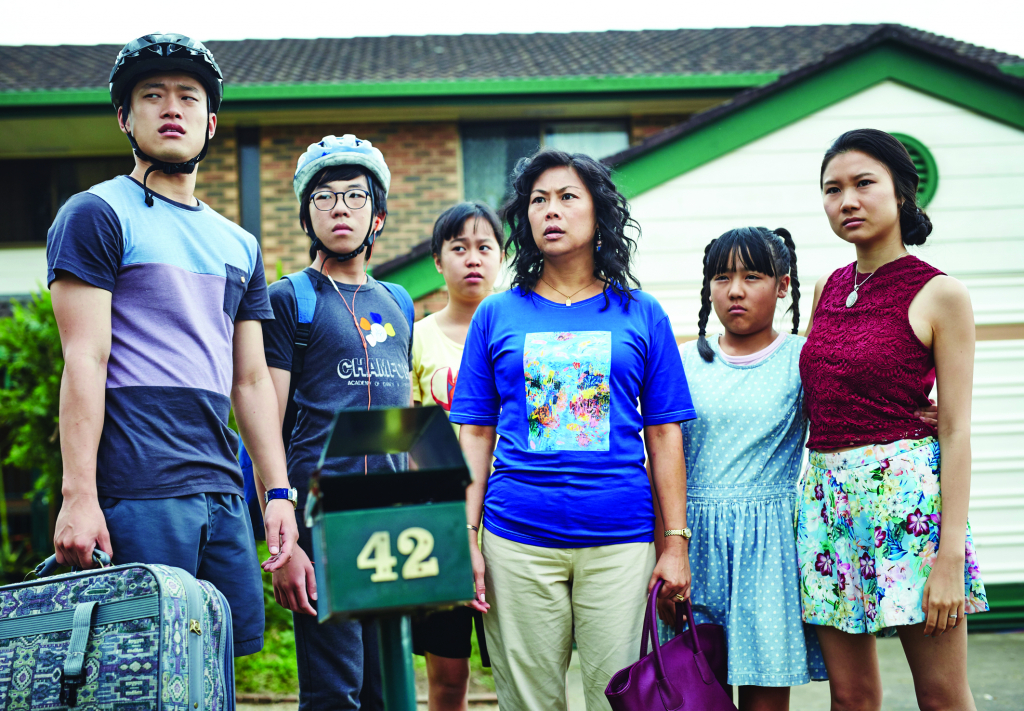
A quota for diversity on TV is something that could be legislated, but material change in scripted content can only occur if those at the helm of projects and networks are of diverse backgrounds themselves. (A non-Anglo lead on Home and Away may be a long way off.) While Law is ‘stoked’ to be part of a production that has showcased the talents of a predominantly Asian cast, as well as treating audiences to smatterings of Cantonese and Japanese, he clarifies that he doesn’t wish to be the poster child for Asian-Australian issues. He maintains that his job is to craft compelling stories for audiences, rather than hector behind a lectern:
You don’t want to necessarily think of yourself or position yourself as ‘we’re a groundbreaking show’ because, first and foremost, your responsibility is to tell a really ripper story. And I think, once you start becoming earnest or really focused on the politics of what you’re trying to do with the show, it can cripple the quality of the writing as well.
With The Family Law having screened in Paris in April this year for Séries Mania – a kind of Cannes for the TV set – the imperative to promote the twin objectives of diversity and superb writing is more urgent than ever. Law reveals that people outside Australia have already started tweeting about the show. ‘Okay, so they’ve clearly pirated it,’ he laughs. No matter: it’s a good sign for a series that has stolen hearts and tickled funny bones in Australia that it could well do the same around the world.
http://www.sbs.com.au/programs/the-family-law/
Endnotes
| 1 | See Fredric Jameson, Postmodernism, or, The Cultural Logic of Late Capitalism, Duke University Press, Durham, 1991. |
|---|---|
| 2 | ‘The Family Law: About the Series’, SBS website, 30 November 2015, <http://www.sbs.com.au/programs/the-family-law/article/about-series>, accessed 2 May 2016. |
| 3 | Annabel Ross, ‘Benjamin Law Puts Multicultural Australia in the Spotlight’, The Sydney Morning Herald, 7 January 2016, <http://www.smh.com.au/entertainment/tv-and-radio/drama/benjamin-law-puts-multicultural-australia-in-the-spotlight-20160101-glxscw.html>, accessed 2 May 2016. |
| 4 | See Louis Degenhardt, ‘What Is Conscious Uncoupling?’, The Guardian, 26 March 2014, <http://www.theguardian.com/lifeandstyle/2014/mar/26/conscious-uncoupling-gwyneth-paltrow-chris-martin>, accessed 4 May 2016. |
| 5 | See, for example, Jimmy Nguyen, ‘A New Era for Asian Americans in Starring Roles’, The Huffington Post, 21 February 2015, <http://www.huffingtonpost.com/jimmy-nguyen/a-new-era-for-asian-americans-in-starring-roles_b_6727266.html>, accessed 2 May 2016. |
| 6 | K Connie Kang, ‘Girl Undergoes Major Changes amid Criticism’, Los Angeles Times, 11 March 1995, <http://articles.latimes.com/1995-03-11/entertainment/ca-41514_1_korean-american>, accessed 2 May 2016. |
| 7 | Wesley Yang, ‘Eddie Huang Against the World’, The New York Times Magazine, 3 February 2015, <http://www.nytimes.com/2015/02/08/magazine/eddie-huang-against-the-world.html>, accessed 2 May 2016. |
| 8 | Amanda Meade, ‘Lisa Wilkinson “Too White” for Gold Logie, Jokes Karl Stefanovic’, The Guardian, 5 April 2016, <http://www.theguardian.com/media/2016/apr/05/today-presenter-jokes-lisa-wilkinson-too-white-logies>, accessed 2 May 2016. |
| 9 | See Tim Soutphommasane, ‘Are Asian Australians Trapped Under a Bamboo Ceiling?’, The Guardian, 11 July 2014, <http://www.theguardian.com/commentisfree/2014/jul/11/are-asian-australians-trapped-under-a-bamboo-ceiling>, accessed 2 May 2016; and Tim Colebatch, ‘Land of Many Cultures, Ancestries and Faiths’, The Sydney Morning Herald, 22 June 2012, <http://www.smh.com.au/federal-politics/political-news/land-of-many-cultures-ancestries-and-faiths-20120621-20r3g>, accessed 5 May 2016. |
| 10 | Tony Ayres, quoted in ‘Q & A with Australian Screenwriter/Producer/Director Tony Ayres’, Joy House Productions, 8 April 2015, <http://joy.net.au/q-a-with-australian-screenwriter-producer-director-tony-ayres/>, accessed 2 May 2016. |
